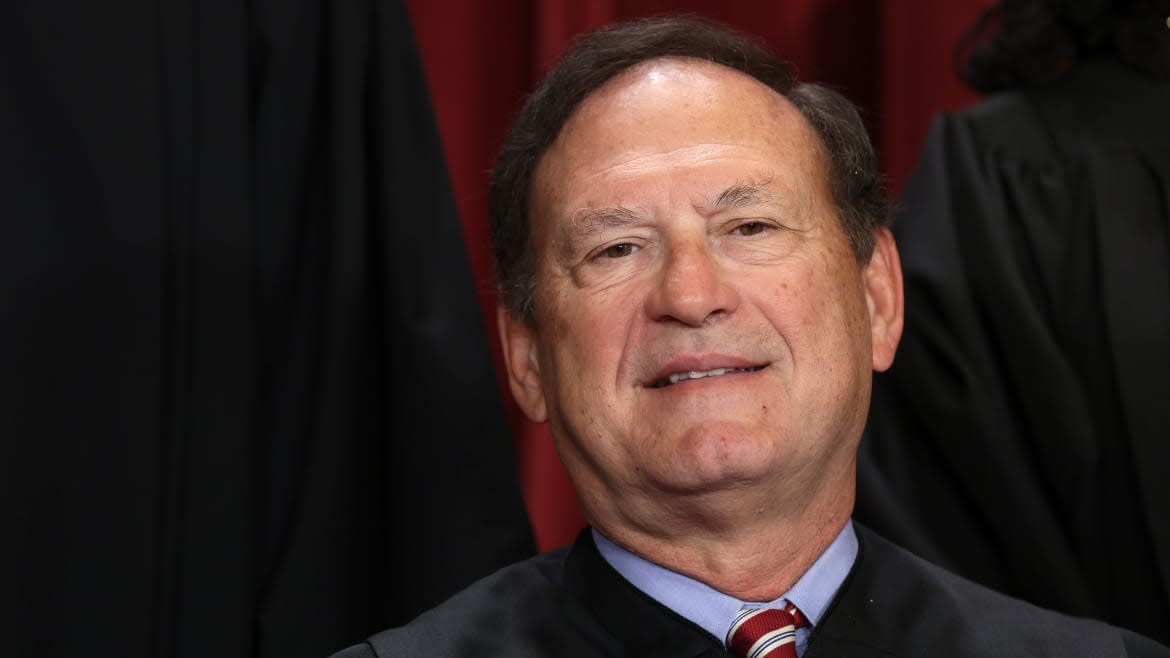New SCOTUS Leak: Alito Even Alienated Other Conservatives

- Oops!Something went wrong.Please try again later.
- Oops!Something went wrong.Please try again later.
- Oops!Something went wrong.Please try again later.
- Oops!Something went wrong.Please try again later.
- Oops!Something went wrong.Please try again later.
- Oops!Something went wrong.Please try again later.
Conservative Supreme Court justices have abandoned Samuel Alito not once but twice this year after finding his draft majority opinions went too far, according to a new leak from the court.
Alito has been tapped to write the majority opinion only to find himself losing it on two separate occasions in 2024, sources told CNN. Such losses—which are reportedly rare—come amid “increasingly palpable” frustration with the 74-year-old in the courtroom, according to the network.
Supreme Court Rocked by New Leak of Bitter Abortion Split
One of Alito’s defeats came when Amy Coney Barrett and Ketanji Brown Jackson decided to jump ship from a slim 5-4 majority, according to CNN.
That case stemmed from Republican-backed Texas and Florida laws, enacted in 2021, which restricted social media platforms from filtering third-party content. The laws passed just months after Twitter and Facebook removed Donald Trump’s accounts from their sites in the wake of the Jan. 6, 2021, Capitol riot, with conservatives expressing concerns that their views were being censored on social media.
Tech industry trade group NetChoice brought lawsuits against the laws in both states, arguing that they violated social media companies’ First Amendment rights. U.S. district court judges in Texas and Florida temporarily halted the laws from coming into force, leading to appeals.
The 5th US Circuit Court of Appeals said platforms’ content moderation is not “speech” that would be protected by the Constitution. Ruling on the Florida law, however, the 11th US Circuit Court of Appeals came to the opposite conclusion, finding that content moderation implicated First Amendment protections over “editorial discretion.”
The Supreme Court heard oral arguments in the paired appeals on Feb. 26. The justices met in private a few days later where they agreed that NetChoice’s broad claims of unconstitutionality fell short and that the cases should return to lower courts for more hearings.
But they were reportedly split on the guidance to give the lower courts. Alito was receptive to the 5th Circuit position, playing down the social media companies’ speech interests while emphasizing “the incompleteness of the record and the need to remand the cases,” according to CNN. He was joined by conservatives Neil Gorsuch, Clarence Thomas, and “to some extent,” Barrett and Jackson, the network reports.
Justice Elena Kagan, however, leaned more toward the 11th Circuit’s view. She was “generally” joined by Chief Justice John Roberts and Justices Sonia Sotomayor and Brett Kavanaugh, CNN reports.
Alito then began writing the court’s opinion for his five-strong majority and Kagan for the other four. When Alito circulated his draft opinion to colleagues several weeks later, his majority started to fall apart, according to CNN. Alito questioned if any of the content moderation activities undertaken by platforms qualifies as “expressive” activity under the First Amendment, while Barrett believed certain decisions about content do reflect protected editorial judgements.
Barrett “became persuaded by Kagan,” according to CNN, with Jackson also agreeing with much of Kagan’s analysis. He was left with the support of just Thomas and Gorsuch.
Weeks earlier, Alito lost another tentatively won majority because of how widely he wanted the court to rule, CNN reports. The earlier case related to claims from Sylvia Gonzalez, a councilwoman in Castle Hills, Texas, who said she’d been arrested as retaliation for criticizing the city manager.
Gonzalez’s claim had been rejected by the 5th Circuit, which emphasized officers had probable cause to make the arrest and noted that she failed to show police had not made arrests in similar cases.
Supreme Court justices voted on the case in March, with the majority agreeing that the 5th Circuit had “erred in the standard it used,” according to CNN. Alito was assigned the opinion but, as he started writing it, he reportedly went further than other justices and the majority fell apart.
In an unsigned opinion from a new majority, the high court ruled that the federal appeals court took an “overly cramped view” of a precedent of when plaintiffs can sue for First Amendment retaliation claims. It did not indicate how Gonzalez’s case may end up, however.
Alito on the other hand, in what eventually became a 16-page concurring opinion, looked at weaknesses in her arguments. His opinion would have made it harder for Gonzalez to press her claims than the five-page opinion which led to the new majority, according to CNN.
Get the Daily Beast's biggest scoops and scandals delivered right to your inbox. Sign up now.
Stay informed and gain unlimited access to the Daily Beast's unmatched reporting. Subscribe now.

